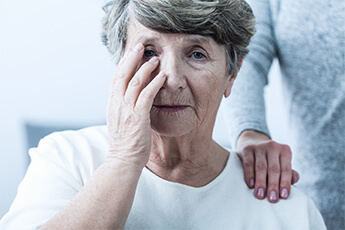4 tips for living with tardive dyskinesia

The involuntary, uncontrollable facial movements that tardive dyskinesia (TD) causes can be life-disrupting. These facial tics may make it harder to have conversations, dine out, work, and enjoy life.

A study published in the Journal of Clinical Psychopharmacology found that 3 in 4 people with tardive dyskinesia feel self-conscious or embarrassed by these involuntary movements. More than 40% of people with tardive dyskinesia say the condition negatively affects their daily lives. It interferes with their ability to talk, socialize, and get things done.
It’s estimated that at least 500,000 Americans have tardive dyskinesia. The movement disorder affects about 1 in 4 people who take antipsychotic (neuroleptic) medications. People who take certain medicines for gastrointestinal and neurological conditions are also at risk.
People with tardive dyskinesia develop symptoms like uncontrollable tongue thrusting, lip smacking, eye blinking, and chewing motions. These symptoms may go away or lessen when you stop taking a medicine or change the dose. Other treatments may help, but some people have symptoms that won’t go away.
Living with tardive dyskinesia can be challenging. These tips can help you cope:
getting help from your doctor
managing stress
quitting smoking
seeking and accepting support
Getting help from your doctor
Often, the first step in addressing tardive dyskinesia symptoms involves getting off the medicine causing the problem. Because you most likely need the medicine to manage a chronic condition, you should never stop a medicine on your own. It’s important to continue treating the underlying condition. Plus, it’s possible that abruptly stopping a medicine may worsen the underlying condition or tardive dyskinesia symptoms.
Your doctor will want to wean you off of the medicine. You may gradually decrease the dose by 10% to 25% every 1 to 3 months (follow your doctor’s recommendations). Eventually, you may switch to a different medicine that isn’t likely to cause tardive dyskinesia or worsen existing symptoms.
If the medication changes don’t help, go back to your doctor and ask about other options. Medications that lower dopamine production may make symptoms less noticeable to others and more tolerable for you. These medicines include deutetrabenazine, tetrabenazine, and valbenazine.
Managing stress
Tardive dyskinesia symptoms can get worse when you feel anxious or stressed. You may find that your tics or tremors become more frequent or severe. Stress is an unavoidable part of life. But you can take steps to decrease stress and anxiety. These actions may help:
Go for a walk. Physical activity releases feel-good endorphins. Walking outside and breathing in fresh air can boost your mood and distract you from your worries. Your stress level may go down even more if you walk with a dog. Studies show that dog owners have less stress and lower blood pressure. They also get more exercise and seem happier.
Make time for you. Aim to do at least one thing each day that brings you joy. It could be meditating, getting together with a friend, reading a book, or working on a hobby.
Write in a journal. Each day, write down your accomplishments. Try to capture positive events and the little things that make you feel grateful.
Soothe your soul. Activities like meditation, yoga, and deep breathing exercises are calming. You can also relax to your favorite tunes or soothing sounds.
Quitting smoking
Studies suggest that people who smoke are more at risk for developing tardive dyskinesia. Nicotine in cigarettes, including vape from electronic cigarettes, can lower the effectiveness of antipsychotic (neuroleptic) medicines.
These medicines treat certain mental health conditions like schizophrenia. People who smoke may find that they need to take higher medication doses to effectively control their disease. Once you have tardive dyskinesia, continuing to smoke can make symptoms worse.
Nicotine can also raise dopamine levels. There appears to be a causal relationship between dopamine and tardive dyskinesia. People with certain mental illnesses or other health conditions who take medications that block dopamine are more likely to get tardive dyskinesia.
Seeking and accepting support
The medications most likely to cause tardive dyskinesia are antipsychotics (neuroleptics) for mental illness and antinausea (antiemetics) for certain stomach problems. Managing a chronic illness of any kind can be stressful and exhausting. Adding another condition like tardive dyskinesia to the mix can truly seem overwhelming.
You don’t have to manage these conditions and your emotions on your own. Family, friends, and professional resources are ready to help. Consider taking these steps:
Get support. Join an in-person or online support group to talk about your mental illness or chronic condition. There are also support groups for people with tardive dyskinesia. Members of the Inspire Movement Disorders Support Community provide virtual support to people dealing with all types of movement disorders.
Share your feelings. When you feel depressed, frustrated, or even angry, reach out to a trusted loved one or friend. Find that one person (or preferably several people) who will lend a sympathetic ear face-to-face, on the phone, or through a video call. You don’t need to be concerned about burdening someone with your problems. People often want to help, but may feel unsure about what to do. While your family and friends can’t know what it’s like to have tardive dyskinesia, they still want to be there for you.
Speak to a mental health professional. A psychologist or other mental health specialist can help you manage feelings of depression, anxiety, and stress related to tardive dyskinesia. Cognitive behavioral therapy (CBT) is a proven treatment that can help you manage anxieties and respond in a healthier way to life stressors.
From the community: “I also have TD and It's not easy to live with. Each day is a challenge, not to let it keep me from living my life. It's hard not knowing if it will ever go away, There is a lot of information on the net, yet little support for people with it… Each day, I get up and its there, and I do the things that need to be done, like cleaning, taking care of my grandchild. Doing research on TD, and looking for other things to take the focus off the movements… Its hard to live with, but it helps to have a family that loves me. Its also good to be able to talk with people who are going through the same thing. I hope this helps you and others who are going through the same thing.” – Inspire member
Sources
Tardive dyskinesia. Baylor Medicine. 2018.
Having a dog can help your heart — literally. Harvard Health Publishing. September 2015.
Stress management. HelpGuide. September 2020.
RE-KINECT: A prospective study of the presence and healthcare burden of tardive dyskinesia in clinical practice settings. Journal of Clinical Psychopharmacology. May 2020.
Smoking and tardive dyskinesia: Lack of involvement of CYP1A2 gene. Journal of Psychiatry and Neuroscience. May 2003.
Tardive dyskinesia. MedlinePlus. February 2021.
Tardive dyskinesia. Mental Health America.
Tardive dyskinesia. National Alliance on Mental Illness. March 2019.
Tardive dyskinesia. National Organization for Rare Disorders. 2018.
Real-world screening study shows high rates of tardive dyskinesia that interfere with quality of life. Practical Neurology. May 2020.
Disclaimer
Member comments are lightly edited for length and to remove identifying information but are otherwise reproduced as they appear in the community as part of public posts.
This content is for general informational purposes only and does not necessarily reflect the views and opinions of any organization or individual. The content should not be used as a substitute for professional medical advice, diagnosis, or treatment. Please consult your healthcare provider about any questions you may have regarding a medical condition.




